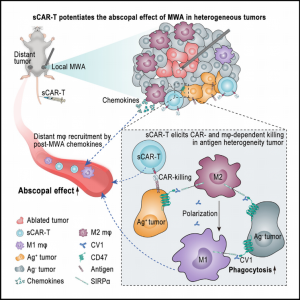A research team led by Zhao Qi, associate professor in the Faculty of Health Sciences (FHS) at the University of Macau (UM), in collaboration with Zhu Kangshun, professor at the Guangzhou Medical University, has achieved a significant breakthrough in tumour immunology. They have developed sCAR-T cells, novel CAR-T cells that secrete a SIRPα variant called CV1, and combined them with microwave ablation technology. This significantly enhances the treatment of distant metastasis in liver cancer. This breakthrough offers new hope to liver cancer patients. The findings have garnered international attention in the field of cellular immunology and have been published in Cell Reports Medicine, a premium journal from Cell Press.
Microwave ablation (MWA) and other thermal ablation techniques use medical imaging guidance to destroy liver tumours in situ by delivering high temperatures. These techniques are minimally invasive and have notable therapeutic effects, and are recommended by multiple domestic and international clinical guidelines for liver cancer treatment. However, the high recurrence rates associated with these ablation methods negatively impact the long-term survival outcomes of patients. Previous studies have shown that MWA can induce a systemic immune response to control metastatic or residual tumours via ‘distant effects’. However, this effect is usually weak and short-lived, which is insufficient for effective tumour elimination. Some studies have investigated combining ablation techniques with CAR-T cell therapy. Although this approach has been shown to suppress distant tumour growth effectively, particularly in cases of homogeneous antigen expression, its efficacy against heterogeneous tumours is limited.
To address these limitations, the research team developed sCAR-T cells that can secrete a SIRPα variant called CV1. These novel CAR-T cells demonstrate both high affinity and the ability to specifically block the ‘do not eat me’ signalling pathway of CD47-SIRPα. The study demonstrated that, when combined with MWA, sCAR-T cells significantly enhanced the destruction of distant tumours with antigen heterogeneity. While targeting and killing tumour cells, CV1 secreted by sCAR-T cells blocks the CD47-SIRPα pathway. This activates the anti-tumour activity of infiltrating macrophages, enabling the elimination of antigen-negative or antigen-low liver cancer cells. In multiple preclinical animal models, including those with liver cancer, treatment with sCAR-T cells markedly enhanced both local and distant anti-tumour immune effects induced by MWA. This combination therapy was found to effectively inhibit postoperative tumour recurrence and metastasis. These findings provide liver cancer patients with a new comprehensive treatment strategy with high clinical potential. This study also opens up new avenues for tumour immunotherapy research and applications.
The corresponding authors of this study are Zhao Qi and Zhu Kangshun. The project was funded by the Science and Technology Development Fund of the Macao SAR (File No.: 0009/2023/RIC and 0010/2023/AKP) and UM (File No.: MYRG-GRG2023-00158-FHS-UMDF and MYRG-GRG2024-00172-FHS). The full version of the research article is available at: https://doi.org/10.1016/j.xcrm.2025.101965.
| Source: Faculty of Health Sciences | |
| Media Contact Information: | |
| Communications Office, University of Macau | |
| Albee Lei | Tel: (853) 8822 8004 |
| Bell Leong | Tel: (853) 8822 8009 |
| Email: | prs.media@um.edu.mo |


